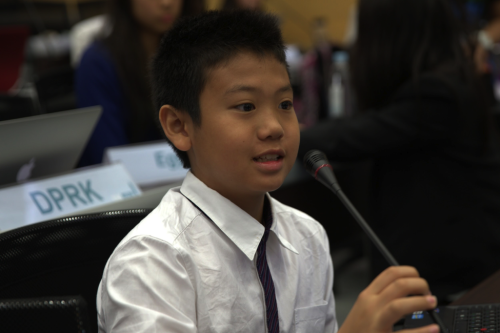
The procedures in UN4MUN make debate more exciting and accessible; even young delegates can get involved
As you may know from BD’s previous article about UN4MUN, most MUN conferences differ from the real UN. That, in itself, is a pretty big shocker for most students who participate in MUN.
When we first heard that the MUN we know and love was wrong, we sat down and looked around at all the other delegates hearing the news for the first time. We can tell you that the majority of them were mirrors of our own faces: mouth agape, a very apparent expression of confusion, excitement and betrayal scrawled across their faces.
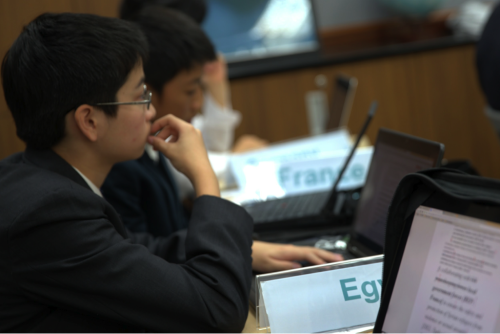
Active listening is essential to understanding the opinions and stances of other delegates, and thus revising and cooperating to reach consensus.
As sophomores at Taipei American School (TAS), we (Haley R. and Leo K.) were selected to serve as head chairs at the home conference, TASMUN, which is held each year in April. Yet, here we were at THIMUN Hague 2015, a few months prior to TASMUN, with an invitation to a presentation arranged by our coach to find out what this new and exciting thing called “UN4MUN” was all about. It was a presentation by Mr. Bill Yotive, manager of the Global Teaching and Learning Project and Education Outreach for the UN.
As soon as the presentation was over, we decided that we had no choice but to bring UN4MUN back to our TASMUN committees. It was just something too important to be ignored. We felt that if students joined MUN to become leaders and to work towards making a difference in the world, it seemed traitorous to keep our newfound knowledge of the real UN’s proceedings from them.
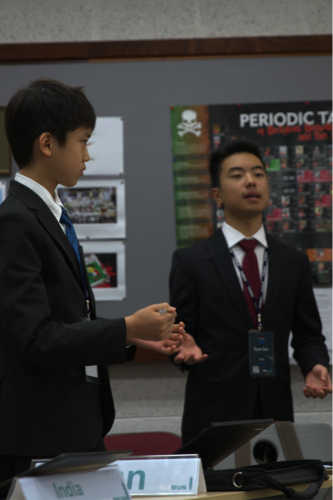
Delegates are able to stand and discuss casually — this allows them to explore contentious issues and resolve problems easier than in THIMUN procedures.
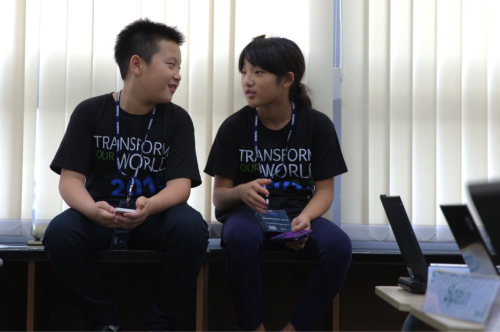
Debate is often contentious and fast-paced — even the note-passing “Pages” got into it.
UN4MUN is an effort to make MUN conferences around the world closer replicas of the true UN. That means that it’s more casual, there’s more time spent lobbying, tons of direct conversation, a lot of resolution-editing and, most importantly, no voting.
The reason UN4MUN operates this way is because voting, in itself, ignores the minority — the implementation of an idea depends only on 51% of the group. The UN stresses the idea of collaboration to achieve consensus, and voting only works counter to those aims: it excludes and thus disincentives countries from actually implementing the solutions in a resolution.
Traditional MUN leads you to believe that the focus should be on voting and structured debate when it really should be on achieving maximum agreement about the actions countries will take to solve the issues. This is how the real UN operates, so it is how UN4MUN operates. Nevertheless, to a regular MUNer, learning UN4MUN procedure is initially strange and confusing. We were no exceptions.
The Preparation
The preparation for the conference was far from a breezy exploration and then gradual implementation of the new process. Our journey ended up being more turbulent, somewhere between mystification and complete chaos. If we were to sort it out, we probably spent twenty percent of the time arguing, ten percent of the time absolutely certain that we understood what we were meant to be doing, and the other seventy percent in absolute bewilderment.
We started out with a document that was intended to be a comprehensive guide for delegates to easily understand the new procedures. The final document that we emailed to our delegates was the result of weekly meetings, countless discussions, and near nightly crises about something new we suddenly didn’t understand. We scoured online databases, UN websites and YouTube videos to figure out how exactly this was going to work.
Our only experience with UN4MUN going into the conference preparation was a presentation on the UN by Mr. Yotive and a single, four minute video shown to us once to help us get our bearings. From the time we left THIMUN, we were on our own. To figure everything out, we hunted through the UN databases that Mr. Yotive provided us (a very lengthy selection of articles) and scoured the archives of MUN websites around the world in hopes of finding procedural guidelines.
Over a period of several weeks, we managed to collect different (and sometimes conflicting) documents from a variety of sources. Finally we contacted BD and were provided with by far the most useful and straightforward documents of the whole bunch. We spent hours sorting out the confusing information, attempting to consolidate it down to a concise, simple list for our delegates.
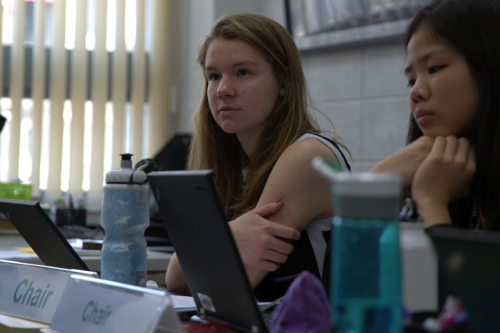
Chairs facilitate but take a lesser role, allowing delegates to regulate the flow of debate.
Besides figuring out all the details, we had some serious questions about how the conference was going to work. How many resolutions should we debate? Will we run out of time? Will we have extra time? How can we make this work for us while still imitating the real UN?
To answer this last question we spent a good deal of time ensuring that the procedures we used provided for maximum delegate control while preserving the chair’s ability to intervene – a fine balance. While the UN has hundreds of topics that are debated each year, we chose to narrow it down to just one topic, to make sure that debate could be detailed and focused.
With all these questions and ideas in mind, we set off to train the TAS delegates (and ourselves) how to use the procedures before the conference began, stepping down the bumpy road of constant script consultations and training sessions so that we could make sure everyone completely understood. By the time of the conference, we had trained a small army of delegates that were familiar and comfortable with how the conference was to run — a step, we later learned, would ultimately make the conference as successful as it was.
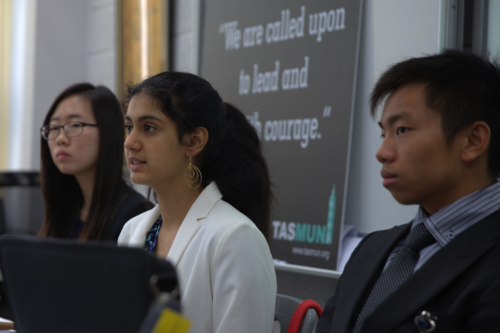
Chairs only intervene in debate when conversation gets out of hand or progress cannot be made; instead of acting as a facilitator for debate, the chair acts as a mediator for arguments.
The Conference
No other words can express it: the conference was a success for UN4MUN procedures. The ideas of collaboration, cooperation and consensus-building that UN4MUN stresses were taken up by the delegates and championed throughout the two days of debate. In one committee, we barely made it to the end of the resolution in time.
But in the last 5 minutes of debate, the committee of 17 delegates passed the resolution resoundingly by consensus. The other committee made it through just three clauses throughout the whole conference, but it was the most detail-oriented and thorough debate we had ever seen.
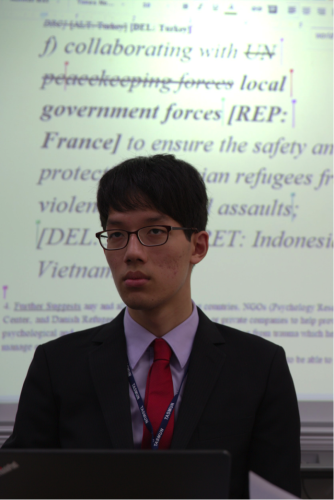
Delegates go through an extensive process of revision until everyone can agree to the resolution by consensus.
We held a debrief session at the end of the conference, and the majority of delegates claimed that it was one of the most enjoyable conferences in which they had ever participated. When we asked the reason why they shared this opinion, we discovered that the subtle differences between THIMUN procedures and UN4MUN were the main reasons.
The more casual setting of UN4MUN allows for discussion, without allowing delegates to duck questions or turn a blind eye to problems. The general lack of voting in UN4MUN forces problems to be resolved before progressing onwards, an aspect that compels delegates to explore the opinions of the minority because they simply can’t rely on a majority to pass their ideas along.
We were most proud of how delegates took the idea of cooperation to heart. UN4MUN obligates delegates to make changes not because something is disagreeable, but to make changes based on the desire to understand what the disagreeing parties think and why they think it — that is the key to reaching consensus.
The delegates caught on to this fundamental idea in the course of a two-day conference, completely of their own accord. Without any prodding besides the adoption of these new procedures, we suddenly had on our hands a group of detailed, thorough, and analytical delegates that were prepared to take on all the conflicting opinions regarding drone usage or Syrian refugees.
We had delegates that saw disagreement as an opportunity for discussion, not an impediment to getting through the resolution as quickly as possible (as is often the case in THIMUN procedures).
At the closing of the conference, it seemed that both chairs and delegates were satisfied with UN4MUN procedures. Hopefully we will be able to do UN4MUN next year, perhaps even expand it to more committees. More than that, we hope that introducing UN4MUN in Taiwan will help spread the idea of UN4MUN further.
The ideals that UN4MUN embodies and its effects on delegates and chairs alike, in addition to how fantastically cool it is to debate this way, fuels our belief that UN4MUN is something that deserves to be spread. Our world needs every bit of collaboration, cooperation and consensus-building it can get. If UN4MUN can bring those principles to the next generation of global leaders through this compact form of engaging and refreshing debate, we have only one response: bring on the revolution!
(The TASMUN Conference Recap was provided by TASMUN Student Officers, Haley R. and Leo K.)
###
Interested in learning UN4MUN? Here are upcoming opportunities!
- Best Delegate will teach UN4MUN at Columbia University this summer: Our Model United Nations Institute’s “UN Studies” program takes place from July 6-10, 2015. The program is open to high school students and no prior MUN experience required.
- The WFUNA International MUN Conference (WIMUN) in New York City features UN4MUN training, UN speakers, and sessions at the United Nations. The conference takes place from November 11-14, 2015, and is open to both university and high school students (in separate committees).
- UNDPI’s UN4MUN Workshop takes place at UN HQ from November 6-9, 2015. The workshop is by application but WIMUN delegates are automatically admitted.

